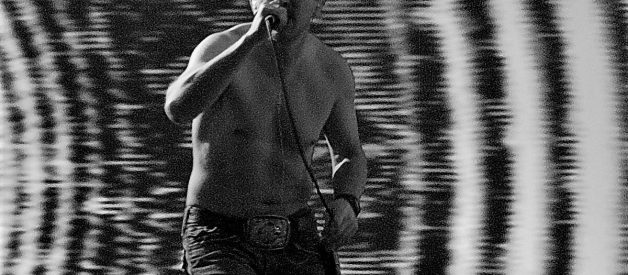
Originally published at Caffeine & Philosophy.
The time has come to go over perhaps my favorite lyrical masterpiece: The Pot by Tool. An almost Shakespearean mixture of vulgarity and high vocabulary, peppered with double-entendres and all wrapped around an unmistakably clear and serious thrust, the song represents the heights of what well-written song lyrics can do. Subjectively, there may be better songwriters out there (the works of Simon and Garfunkle, Bob Dylan, Neil Young, Pink Floyd, and ? of course ? Eminem, all come to mind), but as an objective demonstration of the sheer lyrical skill, The Pot is hard to beat.
Let?s dive in.
Who are you to wave your finger?You must have been out your head.Eye hole deep in muddy waters.You practically raised the dead.
Maynard starts off with a challenge: ?who are you to wave your finger?? The allegation is left open, perhaps intentionally so, and it is not immediately clear if the song is directed for the listener or at them.
?Eye-hole deep in muddy waters? appears fairly straightforward, but what on earth is meant by including the raising of the dead?
Maynard once told an interviewer that ?my more fundamentalist upbringing in Ohio taught me that hypocrisy runs deep.? Given that the song is about hypocrisy, and the most prominent examples of hypocrisy for Keenan (and for many others) come from religion, raising the dead appears to be a subtle allusion to Christianity, as if you say, ?you?re practically as hypocritical as a Christian.?
Speaking of religion, muddy waters may not be that straightforward. We?ll get to why momentarily.
Rob the grave to snow the cradle.Then burn the evidence down.Soapbox, house of cards and glass,So don?t go tossin? your stones around.
If that first line is confusing, you?re not alone. ?Snow? is not just a noun; it can also be a verb, meaning ?to deceive, persuade, or charm glibly.? By robbing the grave to snow the cradle, Maynard is accusing the subject of stealing from one defenseless group in order to predate upon another. But perhaps more importantly, the use of the rather unusual verb ?snow? sets up a juxtaposition with the next line, where the subject ?burns? the evidence down (i.e., hides their work), and this on the tail of inverting the usual order of ?cradle-to-grave? as a phrase.
These kinds of plays upon well-known phrases are invaluable to writers because phrases we are familiar with resonate with the listener, but if left in their ordinary form, they often sound cliche and pass in one ear and out the other. Inverting or playing with the phrase piques listener interest with familiarity and novelty simultaneously, making the lyrics more engrossing.
But ?rob the grave to snow the cradle? has a very direct meaning that is particular to this song. We?ll get to what that is momentarily.
?Soapbox [?] glass? is a brisk clip through three distinct images, the last one being a classical English proverb: ?people who live in glass houses shouldn?t throw stones.? Soap-box alludes, of course, to the religious and political tendency to preach (the two great hypocritical populations), and both card and glass houses represent fragility, i.e., preaching from atop a weak foundation.
?Tossin? your stones around? is not just a completion of the glass houses reference, but a testicular euphemism; in this case, a stand-in for the idiom ?throwing your weight around.? Another example of modifying a common phrase, but this time keeping the form and changing the words, rather than vice-versa.
You must have been high.You must have been high.You must have been?
In my post about Chevelle?s Sleep Walking Elite, I said that musicians who are capable of writing complex lyrics who emphasize a single phrase repeatedly are usually not doing so by accident. Stylistically, ?you must have been high? is a juxtaposition between repetitive clarity and layered complexity, giving a kind of balance to the feeling of the lyrics. But it?s also a kind of emphasis, a vulgar allegation of stupidity or short-sightedness so blind as to look like the work of intoxication. And that?s what it?s all about.
As if to say, ?did you really think we wouldn?t notice??
I doubt that the preceding verse mentioning ?stones? and the accusation of being ?high? are meant to blend (i.e., being ?stoned?), but with Maynard, it?s entirely possible.
Foot in mouth and head up asshole.So what you talkin? ?bout?Difficult to dance ?round this one?Til you pull it out, boy!
Here we go with the idioms again, this time rather directly. The flow from ?foot in mouth? and ?head up asshole? simply sounds natural, as though the two naturally go together. In reality, the two have very different meanings: to say something embarrassing, and to be oblivious to one?s surroundings, respectively. But the comparison highlights a meeting of the two qualities. The hypocrites is both embarrassing to himself and oblivious to his own self-embarrassment.
?Dance ?round? refers to the habit of smart people ? particularly intellectuals ? to come up with excuses and rationalizations for why their theories didn?t work, how they were wrong without really being wrong. That often works with more complex subjects like economics, or politics. But with hypocrisy over values, or how we ought to live our lives, people can see through the cognitive contortions and Frankenstein theories. The only way to get through to people is to come clean and pull it (one?s foot or head) out.
You must have been so high.You must have been so high.
It?s worth mentioning that the idea of being ?talked down to? rests on an image of the speaker elevating themselves above the listener. ?Condescend? literally means to put oneself on a level with inferiors (Latin con- means bringing together; descendere gives us ?descend,? meaning to go down). ?You must have been so high? is not just an allegation of drug use, but a pointed accusation of being condescending, of the speaker believing himself to be higher and better than the rest.
Steal, borrow, refer, save your shady inference.Kangaroo done hung the juror with the innocent.
In this first line, we see an interesting play with words. The written words ? ?steal, borrow, refer, save your?? seem to list similar kinds of shady interactions; specifically, how criminals like to refer to what they steal as borrowing. But listen to the enunciation and we see what might be a subtle verbal allusion to drugs and religion: ?reefer savior.?
Steal, borrow, reefer savior ? shady inference.
In this case, the shady inference would be the high (stoned or elevated?) savior, rather than verbally telling someone not to share their opinion with the singer.
Herein is actually the crux of the song: Christianity. If this religious talk sounds a little bit far-fetched, take a look at the lyrics of Maynard?s very personal song Judith (the name of his mother, who became crippled when Maynard was still a child) to see a less hidden display of disgust and contempt for Christianity.
The second line begins with a play on ?kangaroo court? (as well as ?hung jury?), but to fully grasp the meaning of this interesting rephrasing, we have to get the frame right. After all, why would a kangaroo court hang the juror?
Put in the context of the religious undertone that permeates the song, the line comes into focus. The juror (the judge of the innocent or guilty) is Jesus, ?hung? on the cross by his own doing? and, incidentally, put up ?high? as a result.
Christianity is often condemned by atheists and pagans for holding everyone to be guilty and damned to hell, even the righteous and the good. Even Maynard?s mother.
As it is written, there is no one righteous, not even one; there is no one who understands; there is no one who seeks God. All have turned away, they have together become worthless; there is no one who does good, not even one.
? Romans 3:10?12
Does robbing the grave to snow (deceive) the cradle (children) come into clearer focus now?
Returning to the lyrics:
Now you?re weeping shades of cozened indigo,Got lemon juice up in your eye!When you pissed all over my black kettle,You must have been high, high.You must have been high, high.
Cozened means to trick or deceive, especially to obtain through deceit, so ?weeping shades of cozened indigo? means crying fake (?crocodile?) tears. Indigo is not merely a novel synonym for blue; it is a doubling down on the charge of deception because indigo is not just a color, but specifically, a dye used for turning things blue.
Putting lemon juice in your eye is a quick and easy (and painful) way of making yourself cry, but given its proximity to the immediate next line ? ?when you pissed all over my black kettle? ? Maynard might be voicing his doubts about the real identity of the yellow liquid that our high savior is making himself cry with.
If it wasn?t clear by now, ?black kettle? is the key to understanding the title of the song. If the pot calling the kettle black is hypocritical, then Maynard is singing about the hypocrite.
Who are you to wave your finger?So full of it.Eyeballs deep in muddy waters.Fuckin? hypocrite.
Now that we?ve delved into religion a little bit, it?s time to revisit ?muddy waters.?
On its face, muddy waters alludes to things that are murky and confusing, and it isn?t uncommon in debates to hear accusations of ?muddying the waters? towards people who bring up emotionally charged but irrelevant points to baffle listeners. But it may also be an allusion to something else.
One of the most prominent occultists in 19th century was Madam Blavatsky. In the late 1880?s, she referred to the ?muddy waters of materialism? twice, in La Revue Theosophique, and in the Beacon of the Unknown VII. Ordinarily, this would not be the most likely reference we might assume of ?muddy waters,? general as the phrase is. But if religious hypocrisy is the target of this song, then Madam Blavatsky?s interpretation is doubly perfect. First, because Christianity claims to transcend materialism, even the material world itself, and yet many Christians are bound up in material pleasures and pursuits just like everyone else. Secondly, the occult reference amplifies the impact of the charge, simply because Madam Blavatsky said it. Christianity condemns the occult as evil, and yet Christianity is ? in Maynard?s words ? ?eyeballs deep? in the muddy waters of materialism.
We know that Maynard is at least familiar with occult beliefs from the lyrics of ?Lateralus:?
As below so above, and beyond I imagine
The scorpion tattoo on his back
So even if Maynard is not himself an occultist, he appears to be intentionally invoking occult rejections of materialism, as if to say ?even those you think are evil are doing what you are hypocritically advocating, better than you??
Liar, lawyer, mirror, show me what?s the difference?Kangaroo done hung the guilty with the innocent.
After some alliterative and assonance play (?liar, lawyer, mirror??), Maynard changes the Kangaroo line, swapping ?juror? with ?guilty.? This insinuates that the juror is the guilty party. What do you call a guilty judge?
A hypocrite?
Jesus?
The pot, perhaps?
Now you?re weeping shades of cozened indigo,Got lemon juice up in your eye, eye.When you pissed all over my black kettleYou must?ve been?
So who are you to wave your finger?Who are you to wave your fatty fingers at me?You must have been out your mind!
Reprising ?who are you?? from the first line is still a playfully ambiguous question (not unlike ?You?re so vain? you probably think this song is about you??). But it also conjures certain Christian associations:
?Who are you?? they asked.
? John 8:25
?Who do people say I am??
? Matthew 16:13
?Fatty fingers? has no overt religious or drug connotations that I?m aware of; it seems to be a simple (yet visually compelling) flourish of the pen.
But while we?re talking fingers, why all this repetition of waving fingers?
To answer that, one need only look at how Jesus is most often portrayed in medieval art:

Weepin? shades of indigo shed without a reason.Weepin? shades of indigo.
Liar, lawyer, mirror for you, what?s the difference?Kangaroo be stoned. He?s guilty as the government.
With ?kangaroo be stoned,? drugs and judgment return: is it that the kangaroo ought to be executed by stoning? or is it that the kangaroo must be high (on? pot? the pot?) to think he can pass judgment? The verse stands alone just fine, without any religious overtones, given the generally acknowledged corruption and dishonesty of politicians. But again, religion makes it more interesting, and Maynard clearly has the background knowledge and the ability to make these kinds of subtle allusions.
One of the big legal questions posed to Jesus was the question of how the Jews were to deal with the Roman government. The Jewish intelligentsia held the Roman government to be immoral and oppressive, but they could not openly say so or they would face charges of sedition and conspiracy. In posing the question to Jesus, the Jewish scholars were hoping to trap him, and his solution ? render unto Caesar what is Caesar?s ? not only got him out of the trap, but shaped Christian thinking about religion and the state for centuries to come. Essentially, Christians believe that the state is inherently ?of this world,? and is therefore separate from life, salvation, and all the goodness of God, which comes from the Church.
In this light, to say that our kangaroo ? God ? is ?guilty as the government? is not just a kind of libertarian allusion to corruption or dishonesty. It?s a comparison, and a categorization of these two things ? God and government ? being of the same kind. One is not ?higher? than another.
?unless, of course, you count being stoned.
Now you?re weeping shades of cozened indigo,Got lemon juice up in your eye, eye!Now when you pissed all over my black kettle.You must?ve been high, high, high, high.
Eyeballs deep in muddy waters.Your balls deep in muddy waters.Ganja, please, you must have been out your mind!
With this last line, Maynard finally explains the connection. Throughout the song, we?d been hearing religion and drugs juxtaposed ? what?s the connection? It seems rather odd, since religion generally prohibits most or all drug use. Christianity certainly does.
But religion is not somehow related to drugs. By addressing the religious hypocrite, perhaps Jesus himself, as ?Ganja,? Maynard is saying religion is the drug. It is the drug that gets people ?high,? in the moral sense, and in their moral, judgmental self-righteousness, makes them into hypocrites. Christianity is the ganja; not just the blackened vessel calling the kettle black, but also the weed smoked by the pious.
It is, to borrow a phrase, the ?opiate of the masses.?
It is the pot.
It?s important not to mistake brilliantly composed lyrics for a brilliantly-composed argument. Just because something can be said in complex, almost fractal-like poetry, with vocabulary beyond the grasp of most grad-students, does not necessarily make it true. The purpose in looking at this song is not to condemn Christianity, but to look at and appreciate the craft of lyric-writing. By this metric, I know of no more masterfully-composed song.
Keenan?s beliefs have, undoubtedly, had an effect on many of his listeners, and this may be troubling to believers who recognize that a well-composed song is not an argument, but is being treated like one (to which Keenan might justifiably reply: ?who are you to wave your finger??). But the point is that a Christian could, in theory, become just as talented and brilliant of a songwriter, if only they acknowledge that music can be powerful.
And if Tool serves as a tool towards that end, then Maynard has served his purpose with the band:
It?s what it sounds like: it?s a verb, it?s a digging factor. It?s an active process of searching, as in ?use us, we are a shovel, we are the match, we?re the blotter of acid, your tool; use us as a catalyst in your process of finding out whatever it is you need to find out, or whatever it is you?re trying to achieve.


